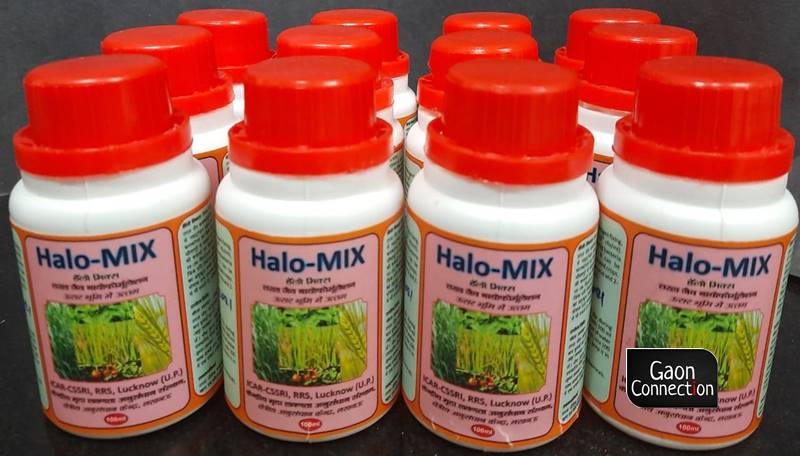A new bioformulation, Halo-MIX, offers hope to restore fallow land and increase crop yield
Agricultural scientists of the Central Soil Salinity Research Institute in Lucknow develop a bioformulation called Halo-MIX that promises to revive fallow lands and make them fit to cultivate again. A 100 ml bottle of Halo Mix is enough to nourish one acre of land.


CSSRI has collaborated with a Hyderabad-based company for its commercial production.
Lucknow, Uttar Pradesh
Farmers who are struggling to grow their crops on fallow land that is high in saline content, have something to rejoice about, as agricultural scientists have found a bioformulation that can revive the dead soil.
Agricultural scientists from the Lucknow-based regional research centre of the Central Soil Salinity Research Institute (CSSRI) have developed a bioformulation that they call Halo Mix, that will soon be available to farmers across the country who are struggling to make their fallow lands cultivable. The formulation has been tried across several districts in Uttar Pradesh with considerable success, the scientists claim.
“High salinity is a problem in many parts of India. The salt content in the soil prevents the sown crop from absorbing nutrients and moisture, which makes them wither away,” Sanjay Arora, principal scientist, CSSRI, told Gaon Connection. But the nutrients in Halo Mix will prevent this, and allow the crops to grow well, he added.

Also Read: A plant-based hydrogel to help farmers tackle water scarcity in the face of climate change
According to the principal scientist, in the last six years nearly 1,400 acres (about 566 hectares) of fallow land in Uttar Pradesh have been productive for both the rabi and kharif season thanks to the use of Halo Mix. Rice, wheat, sugarcane, mustard and vegetables such as cauliflower, brinjal, peas and tomatoes have grown well in Lucknow, Rae Bareilly, Hardoi, Unnao, Sitapur, Sultanpur, Sultanpur, Kaushambi, Pratapgarh, Agra and Etawah.
High salinity land in India
According to data from ICAR-CSSRI, Regional Research Station, Lucknow, there are nearly 6.7 million hectares of land with high salinity. These are across Uttar Pradesh, Bihar, Gujarat, West Bengal and in some states in the south of India. Uttar Pradesh alone has 1.37 million hectares of such unproductive land where nothing grows well.
One way of restoring the nutrients in these lands is by adding a biological modification of gypsum. But this is not easily accessible to farmers. Also, through the years, due to use of chemical fertilisers and pesticides, and the practice of mono-cropping, the soils have been stripped of their natural nutrients and are becoming increasingly unhealthy. Correspondingly, the yields from the crops grown on these soils are also reducing.
Also Read: Traditional polyhouses get a makeover with retractable roofs
To address this problem, the scientists began experimenting with the bio-formulation in several districts in Uttar Pradesh in 2015-16 and their efforts have begun to bear fruit. According to them wheat, paddy and vegetables are flourishing on land that once yielded little produce with the use of Halo Mix. They say that a 100 ml bottle of the formulation is enough to nourish one acre (0.4 hectare) of land.

“The liquid bioformulation, Halo Mix, can fix the inadequacy in the soil and make it fertile again,” Arora said. According to him, Halo Mix has salt-tolerant bacteria that also helps fix nitrogen in the soil that is good for the crops. The formulation also has phosphorus and zinc in it.
CSSRI has collaborated with a Hyderabad-based company for its commercial production.
Also Read: Water hyacinth — a nuisance for water bodies, can now be used to produce organic fertilisers
How to use Halo Mix
“A hundred millilitre of Halo Mix can be mixed with forty kilogrammes of manure and sprayed onto the land. The bacteria in the bio formulation multiplies and renders the soil more nutritious and ready to receive the seeds,” Arora explained.
After the use of Halo Mix, the scientist claimed that the yield of paddy and grain went up by 11.5 per cent and 14.03 per cent, respectively.
The principal scientist hoped that very soon the formulation would be available commercially to farmers across the country.
Also Read: An integrated farming model promises monthly earning of Rs 25,000 from an acre of land
Making Halo Mix commercially available
On August 26, in a video conference, ICAR gave Hyderabad-based Bio Aesthetic Private Limited the license to produce Halo Mix commercially. The technological know-how was given to the company by CSSRI.
In the presence of the director of CSSRI, Karnal, Prabodh Chandra Sharma, scientists of the Regional Research Station, Lucknow, Sanjay Arora and Yashpal Singh handed over the formulation of Halo Mix to the company.
Also Read: From walking five km to the village school to developing the world’s first liquid nano urea
“We have signed an MoU with the company that will commercial make Halo Mix and there is a clause in it that the price of the bioformulation will be kept at the minimum, so that all farmers can afford to buy it,”Arora said.
The scientists claim that Halo Mix will not only improve the health of the soil and the yield, but will also ultimately minimise the use of chemical fertilisers.
Read the story in Hindi

